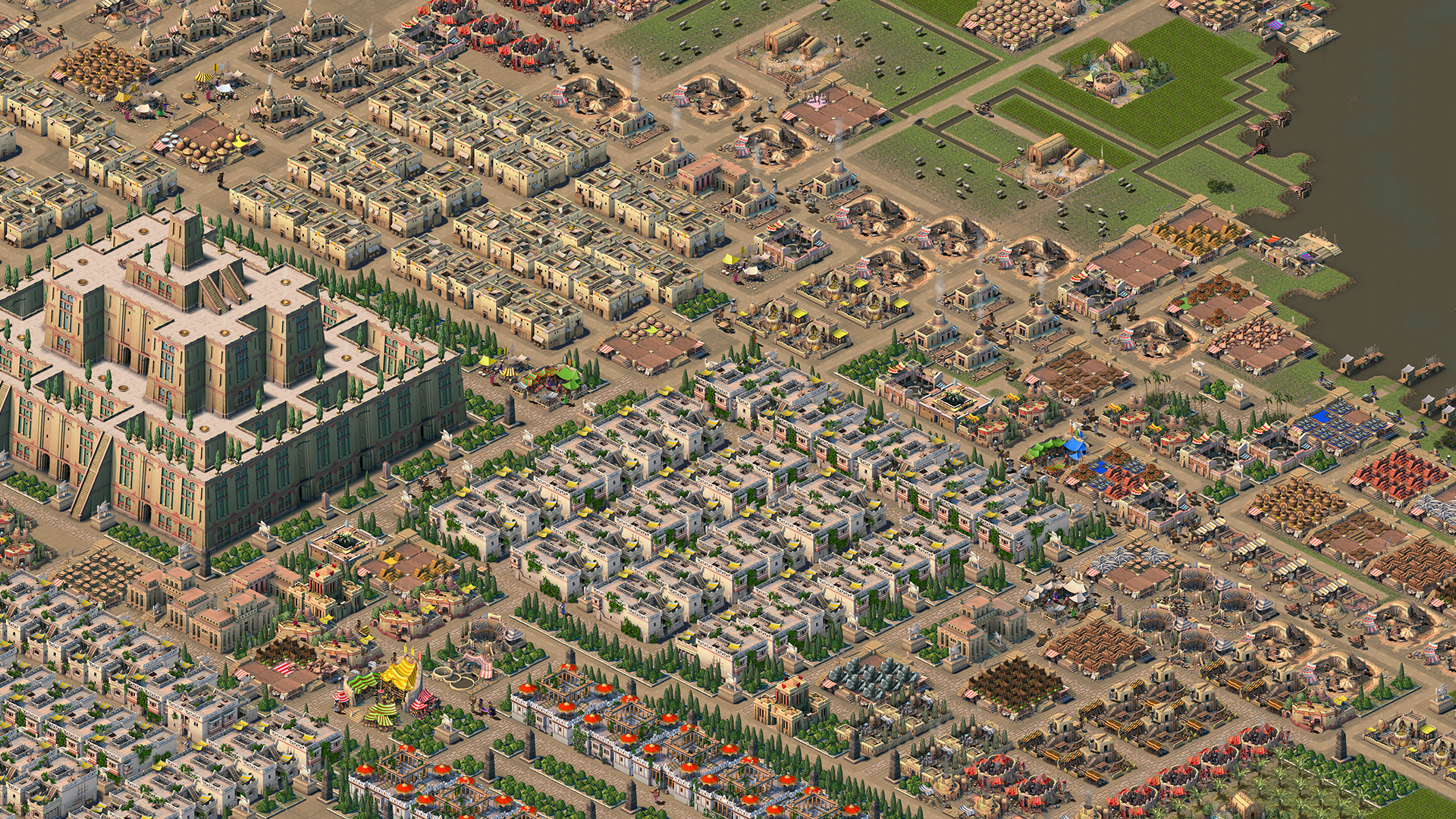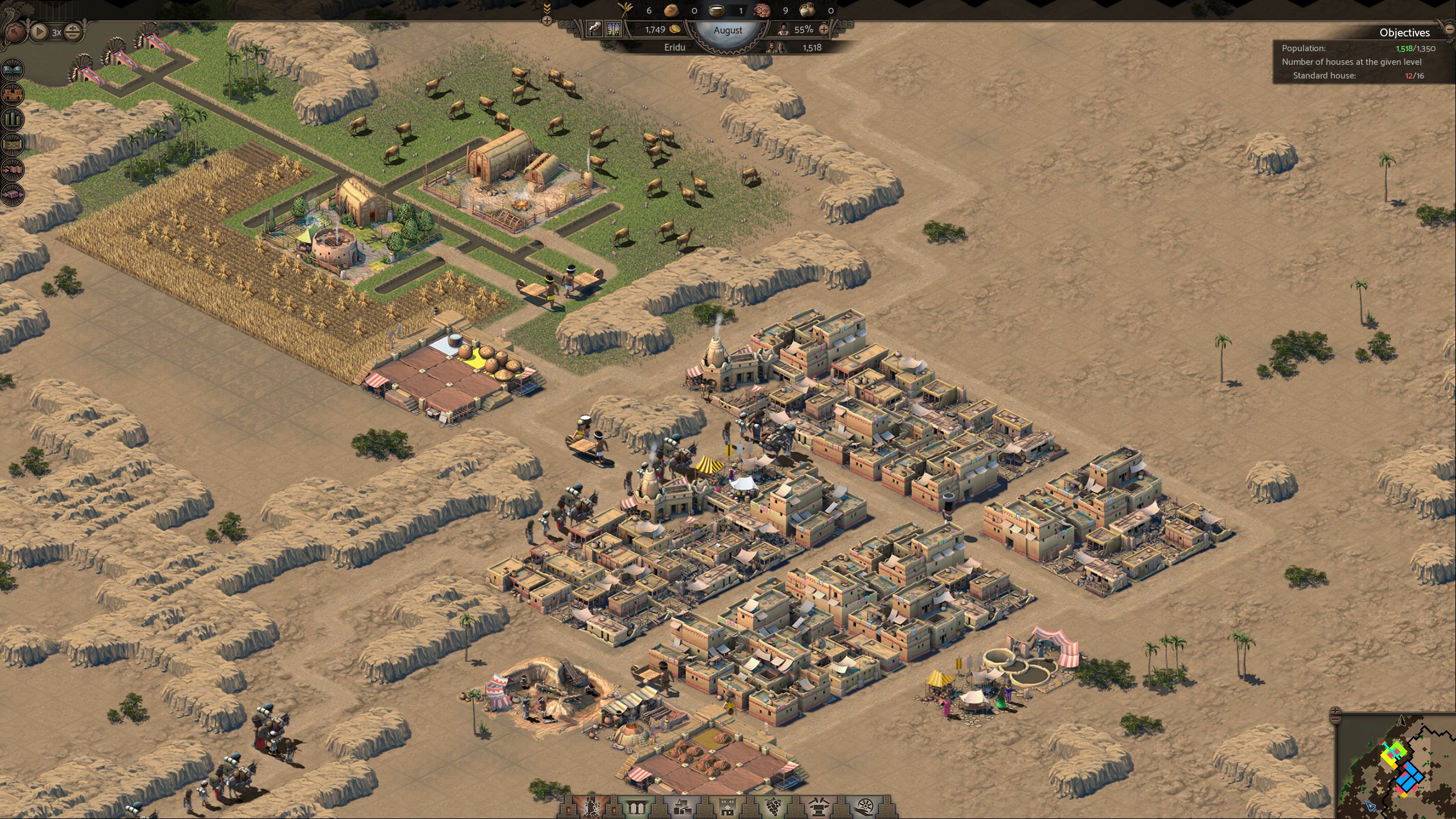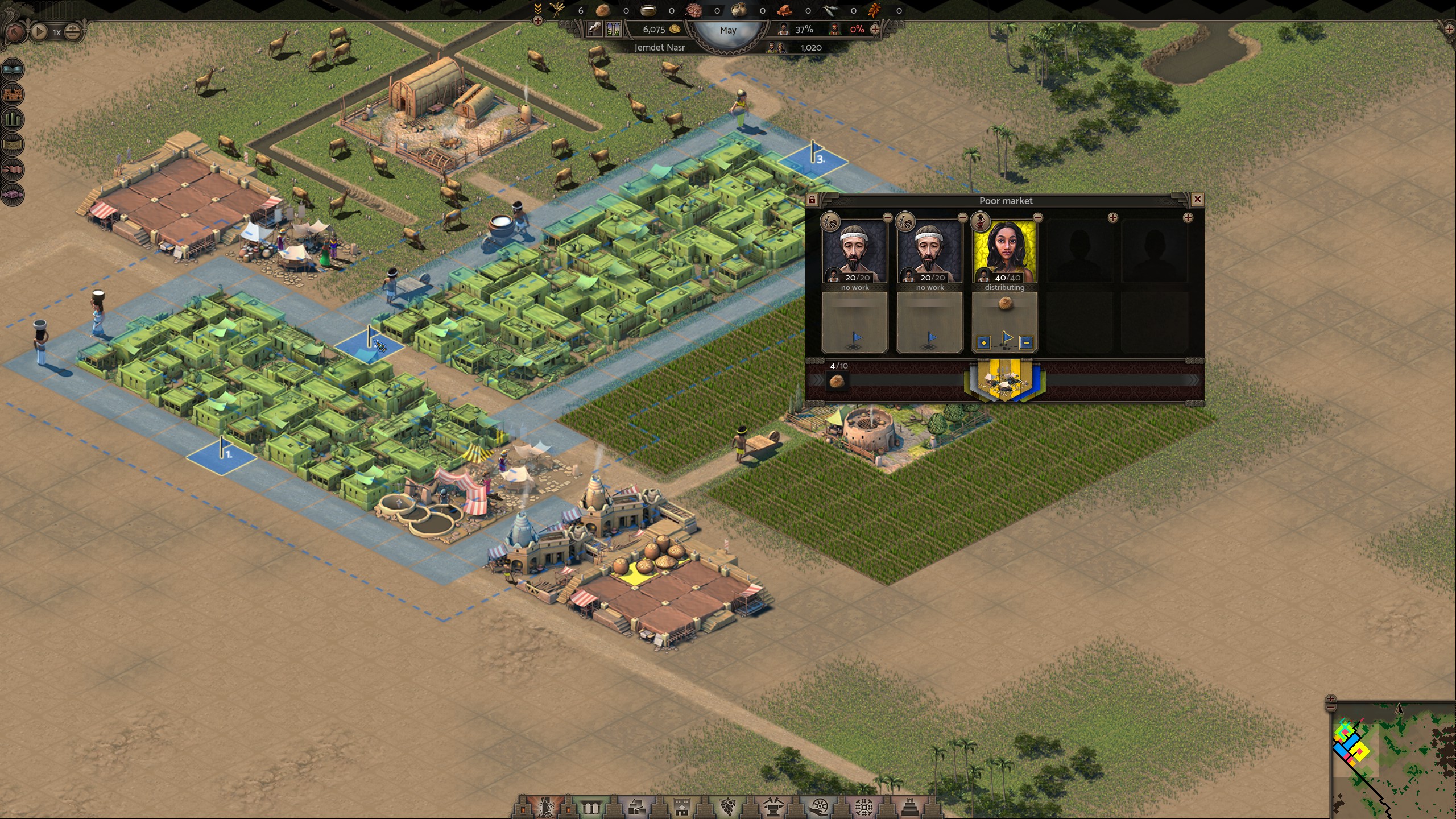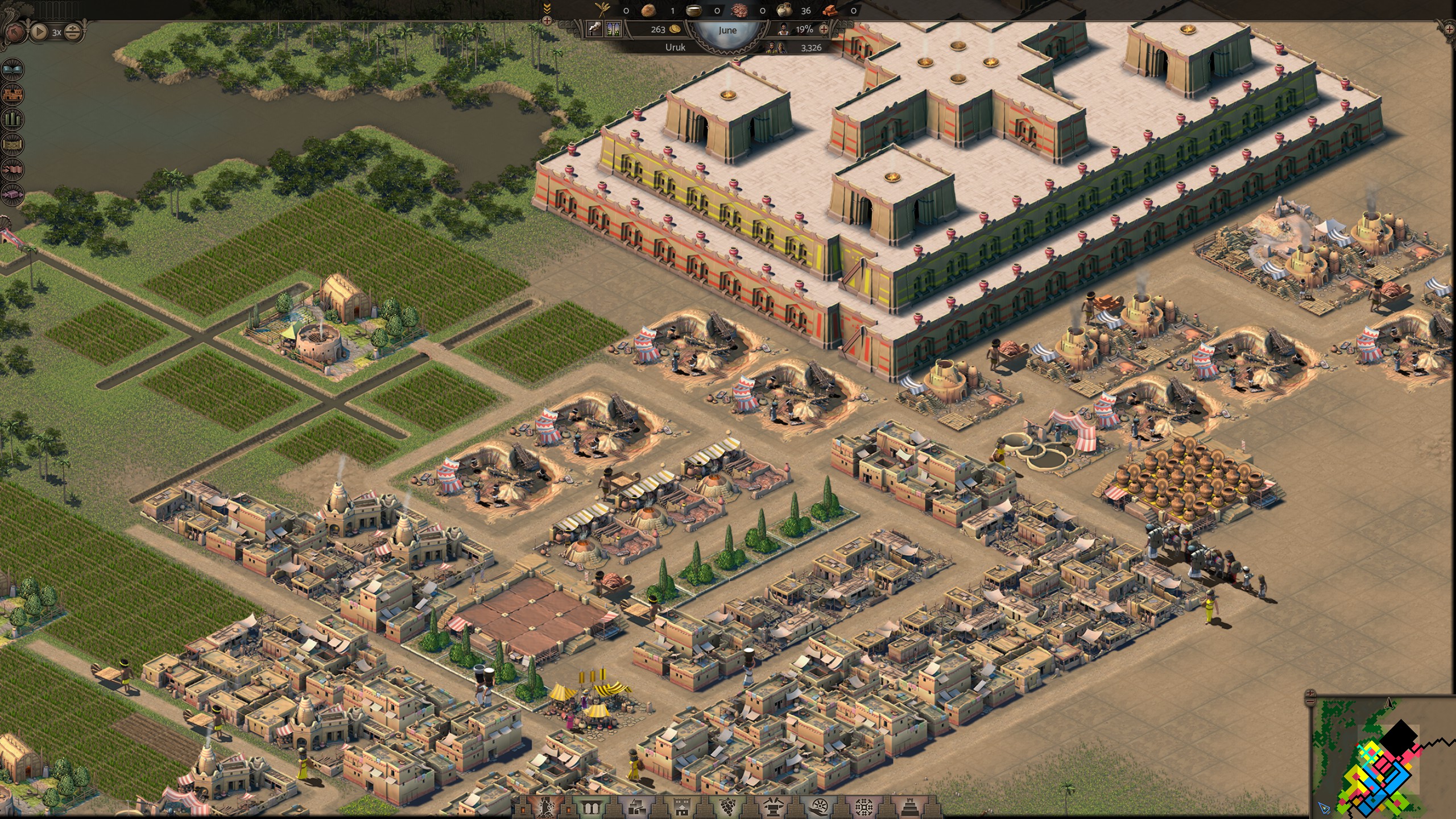Nebuchadnezzar is a throwback to my favourite city builders of 1000 BC and 1999 AD
Nebuchadnezzar builds on classic city builders like Pharaoh with some modern touches.

There is a rhythm to Nebuchadnezzar that anyone who's dabbled in the art of building digital cities will recognise, but which will feel especially familiar to those still carrying a torch for classic Impressions city builders—Pharaoh in particular. It kicks us back to ancient Mesopotamia and 1999, and after playing through a third of the missions, I think I'd quite like to stay here, hanging out in the past.
Even in the not-very-scintillating tutorial missions, Nebuchadnezzar is a welcome time capsule, inspired by the aesthetics and structure that flowed through Caesar, Pharaoh and Zeus. Everywhere are little touches that conjure up these classic games, like the way all your oversized resources are laid out in your storage yards so you can tell what's in there at just a glance.
Like the cities of Pharaoh, Nebuchadnezzar's settlements typically cling to rivers, using the proximity to water to build all the farms needed to support a burgeoning population. While there's a lot of space to build on, most of it is too dry for farming, so the river and the fertile soil around it immediately become the thing that initially defines the shape of your town.

Whether you're playing Anno or Cities: Skylines, building a city usually means putting together a jigsaw. It's not just about finding somewhere for buildings of different shapes and sizes to fit into, but finding the places where they'll be at their most efficient, too. You want storage near businesses, amenities near houses, and you don't want to have your busy residents wasting time hoofing it all the way across the city every day. That part of the city-building puzzle was always especially pronounced in Impressions' games, and the process is even more involved in Nebuchadnezzar.
As soon as the tutorial advisor—the epic hero Gilgamesh, no less—gave me free rein, I proceeded to immediately start obsessing over routes and building ranges. I mercilessly demolished entire farms and city blocks in my quest for perfection, knowing that my people would eventually forgive me when their lives dramatically improved. Yes, it sucks that I had to tear down some shacks, but look, now everyone has new shacks and they're not starving.
The rewards for solving these puzzles usually come quickly. There's something innately satisfying about fixing a kink in the production chain and then seeing a whole block of houses rapidly tier up, fitting even more people inside, and thus filling up the labour pool. More cogs for my glorious, city-building machine!
Despite my lust for logistics, making sure everything is spaced out perfectly to keep houses, manufacturing, storage and resource collection connected can grow into a chore, especially as cities expand. My distance from Pharaoh makes it easy to forget some of its frustrations, but Nebuchadnezzar remembers, and thankfully it provides some solutions. Instead of making you rely on trial and error, the effective range of buildings are all noted clearly, and you can manually assign routes instead of hoping your haulers are covering everything.
The biggest gaming news, reviews and hardware deals
Keep up to date with the most important stories and the best deals, as picked by the PC Gamer team.

Once you've popped someone in the delivery worker slot, you can chart their route through their territory, where they'll deliver their assigned goods until there's no more left in storage. It makes it easier to see why you've got people leaving your city—which they'll do the moment you don't give them what you want. Late on the milk delivery? Wave goodbye to a whole bunch of citizens.
Keeping them stocked up and happy is a ceaseless task, but this extra level of control makes it easier to keep everyone stuck in your city forever. In general, city management is just a bit more granular than Pharaoh, and this extends to the cherry on top of this classic city builder cake: Monuments.
It doesn't take long for Nebuchadnezzar to let you start embarking on the game's most ambitious building projects. Sprawling, towering temples and palaces loom over these Mesopotamian cities and dwarf every other building; they also necessitate a bit of extra effort. Instead of appearing fully formed, these massive buildings are built in stages and eat up mountains of resources. Unlike Pharaoh's monuments, these ones are customisable, letting you determine the shape, height, colour and decorations. Most of these flourishes are purely cosmetic and still require resources, but sometimes you've got to swallow a bit of inefficiency to make something pretty.
Nearly every single tiny tweak you make to your monuments has a cost, but that didn't stop me from recklessly fiddling around with it—I can always get more bricks if I need them, but these monuments need to stand the test of time by looking fierce.
Depending on the monument, there's a perquisite size and height you'll need to reach before you can call the job done, but there's nothing stopping you from carrying on until you're finally satisfied. It's a welcome little break from the cold, calculating world of management and logistics.

Nebuchadnezzar not repeating some of the mistakes of Pharaoh is reassuring, though I might be less enthusiastic about manually assigning routes by mission 15. While it's very much in the nostalgia trade, it's not trapped in the past or bringing back everything regardless of how well it actually works. There are still plenty of modern design sensibilities, too, especially when it comes to the UI, and it's bolstered by mod support that will—fingers crossed—spawn plenty of new buildings and campaigns. It's promising, then, beyond its ability to make me feel like I'm in 1999 instead of horrible 2021.
Nebuchadnezzar is due out on February 17 via Steam, so keep an eye out for our review next week.

Fraser is the UK online editor and has actually met The Internet in person. With over a decade of experience, he's been around the block a few times, serving as a freelancer, news editor and prolific reviewer. Strategy games have been a 30-year-long obsession, from tiny RTSs to sprawling political sims, and he never turns down the chance to rave about Total War or Crusader Kings. He's also been known to set up shop in the latest MMO and likes to wind down with an endlessly deep, systemic RPG. These days, when he's not editing, he can usually be found writing features that are 1,000 words too long or talking about his dog.

